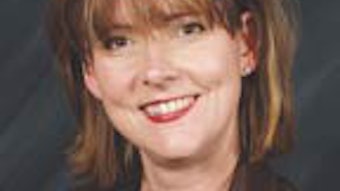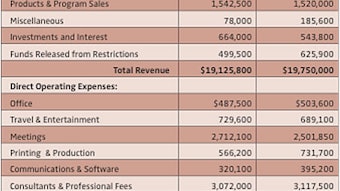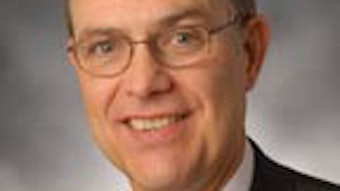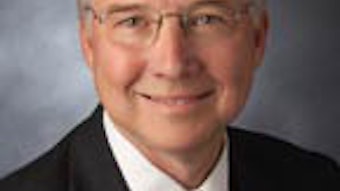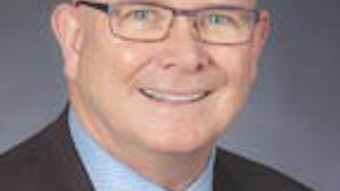BOG Spring Meeting and OTO Advocacy Summit Highlights
Sujana S. Chandrasekhar, MD, Board of Governors chair Last month, otolaryngologists from across the United States gathered in Alexandria, VA, for a two-day legislative, socioeconomic, and grassroots otolaryngology meeting followed by a day of meeting with our legislators. We had ENTs from all stages of their careers: residents, young physicians, mid-career ENTs, and retirees. We had ENTs from all types of practices: academic, private practice, hybrid, employee physicians, and military. Board of Governors (BOG) meetings are known for their lively exchange of ideas. As always, committee meetings were open to all attendees, and all opinions were considered. Committee deliberation topics included maintenance of certification, subspecialization within ENT, local and national legislative issues, and keeping abreast of, and ahead of, insurance changes affecting patient access to quality otolaryngologic care. The PR breakout session taught attendees helpful tips for reaching out to media contacts and responding to questions from print, radio, television, and Internet-based media. The Meaningful Use sessions covered the “nuts and bolts” of maximizing CMS EMR/EHR benefits. We heard from both a coding expert and successful Meaningful Use payment recipients. During a third session, participants heard from successful otolaryngology entrepreneurs on things that they did right and missteps that they made along the way. The ENT PAC reception took place in the beautiful George Washington Masonic Memorial in Alexandria. Our PAC contributes to members of both parties, always on the side of ENTs and our patients. It represents all U.S. otolaryngologists, but only six percent of us contribute. Please visit www.entnet.org/entpac with your five-digit member ID and password (hint: my password is schandrasekhar) to contribute online and become at least a Capitol Club member with your $535 contribution ($1 per Member of Congress). Please see disclaimer on page 44. Monday began with an informal society sharing session on tips for successful local grassroots efforts by different BOG societies. The keynote speaker was Vicki LoPachin, MD, medical director of Northshore University Hospital, part of the nation’s second largest nonprofit, secular healthcare system. She discussed the brave new world of hospital-otolaryngology partnerships. A successful ENT innovator and the head of ENT division at the FDA spoke about going from “wantrepreneurship” to actual entrepreneurship. Our General Assembly featured presentations by the two candidates for the Academy’s president-elect, Michael G. Glenn, MD, and Richard W. Waguespack, MD. We rolled the BOG meeting into the OTO Advocacy Summit, a meeting packed with legislative information and training sessions. The following is a list of our points during our visit to Capitol Hill: Repeal IPAB. The Independent Payment Advisory Board portion of the Affordable Care Act creates an unelected, unaccountable body controlling Medicare policy and usurping the transparency of Congressional oversight. Members of Congress are urged to cosponsor H.R. 452/S. 668 and urge leadership to allow a “clean” vote on these measures. Permanently repeal SGR. The Sustainable Growth Rate formula calculating Medicare reimbursement rates for physicians is neither sustainable, nor growing, but is a rate that has no bearing on the costs of medical practice. Instead of putting last-minute “fixes” averting 30-percent rate cuts, Congress is urged to permanently repeal the flawed SGR formula. Support truth in healthcare advertisements. Americans are often confused and misled about the training and qualifications of their healthcare providers. “Doctor” no longer means MD or DO alone. However, no other type of “doctor” is qualified to diagnose and treat otolaryngologic problems. For the greater benefit of our patients, we ask Members of Congress to support H.R. 451, the Healthcare Truth and Transparency Act. The Congressional Hearing Health Caucus is a bipartisan group committed to supporting the needs of those who are deaf or hard of hearing. The Academy has sponsored efforts to reach out to Members of Congress, with periodic events including hearing screenings and correspondence. Continue the present level of Graduate Medical Education (GME) funding. The budget is a huge problem, but it cannot be balanced while jeopardizing the health of Americans. There is a looming physician shortage in the United States, and ENT is no exception. We urge Congress to refrain from reducing and/or redistributing critical GME program funding. Whether or not you attended the meetings this year, there are many ways to continue participating in the process. You can meet with your legislators at their home offices and discuss the five points mentioned above. You can join the ENT Advocacy Network at www.entnet.org/Practice/members/entAdvocacyNetwork.cfm. You’ll get biweekly, easy-to-digest email updates and Calls to Action that take less than one minute to complete. And, of course, you can get involved and stay involved at the BOG. See you at our fall meeting, Saturday, September 8, in Washington, DC.
Sujana S. Chandrasekhar, MD, Board of Governors chair
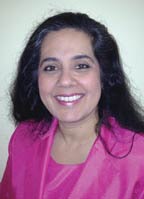 Sujana S. Chandrasekhar, MD
Sujana S. Chandrasekhar, MDLast month, otolaryngologists from across the United States gathered in Alexandria, VA, for a two-day legislative, socioeconomic, and grassroots otolaryngology meeting followed by a day of meeting with our legislators. We had ENTs from all stages of their careers: residents, young physicians, mid-career ENTs, and retirees. We had ENTs from all types of practices: academic, private practice, hybrid, employee physicians, and military.
Board of Governors (BOG) meetings are known for their lively exchange of ideas. As always, committee meetings were open to all attendees, and all opinions were considered. Committee deliberation topics included maintenance of certification, subspecialization within ENT, local and national legislative issues, and keeping abreast of, and ahead of, insurance changes affecting patient access to quality otolaryngologic care. The PR breakout session taught attendees helpful tips for reaching out to media contacts and responding to questions from print, radio, television, and Internet-based media. The Meaningful Use sessions covered the “nuts and bolts” of maximizing CMS EMR/EHR benefits. We heard from both a coding expert and successful Meaningful Use payment recipients. During a third session, participants heard from successful otolaryngology entrepreneurs on things that they did right and missteps that they made along the way.
The ENT PAC reception took place in the beautiful George Washington Masonic Memorial in Alexandria. Our PAC contributes to members of both parties, always on the side of ENTs and our patients. It represents all U.S. otolaryngologists, but only six percent of us contribute. Please visit www.entnet.org/entpac with your five-digit member ID and password (hint: my password is schandrasekhar) to contribute online and become at least a Capitol Club member with your $535 contribution ($1 per Member of Congress). Please see disclaimer on page 44.
Monday began with an informal society sharing session on tips for successful local grassroots efforts by different BOG societies. The keynote speaker was Vicki LoPachin, MD, medical director of Northshore University Hospital, part of the nation’s second largest nonprofit, secular healthcare system. She discussed the brave new world of hospital-otolaryngology partnerships. A successful ENT innovator and the head of ENT division at the FDA spoke about going from “wantrepreneurship” to actual entrepreneurship. Our General Assembly featured presentations by the two candidates for the Academy’s president-elect, Michael G. Glenn, MD, and Richard W. Waguespack, MD.
We rolled the BOG meeting into the OTO Advocacy Summit, a meeting packed with legislative information and training sessions. The following is a list of our points during our visit to Capitol Hill:
Repeal IPAB. The Independent Payment Advisory Board portion of the Affordable Care Act creates an unelected, unaccountable body controlling Medicare policy and usurping the transparency of Congressional oversight. Members of Congress are urged to cosponsor H.R. 452/S. 668 and urge leadership to allow a “clean” vote on these measures.
Permanently repeal SGR. The Sustainable Growth Rate formula calculating Medicare reimbursement rates for physicians is neither sustainable, nor growing, but is a rate that has no bearing on the costs of medical practice. Instead of putting last-minute “fixes” averting 30-percent rate cuts, Congress is urged to permanently repeal the flawed SGR formula.
Support truth in healthcare advertisements. Americans are often confused and misled about the training and qualifications of their healthcare providers. “Doctor” no longer means MD or DO alone. However, no other type of “doctor” is qualified to diagnose and treat otolaryngologic problems. For the greater benefit of our patients, we ask Members of Congress to support H.R. 451, the Healthcare Truth and Transparency Act.
The Congressional Hearing Health Caucus is a bipartisan group committed to supporting the needs of those who are deaf or hard of hearing. The Academy has sponsored efforts to reach out to Members of Congress, with periodic events including hearing screenings and correspondence.
Continue the present level of Graduate Medical Education (GME) funding. The budget is a huge problem, but it cannot be balanced while jeopardizing the health of Americans. There is a looming physician shortage in the United States, and ENT is no exception. We urge Congress to refrain from reducing and/or redistributing critical GME program funding.
Whether or not you attended the meetings this year, there are many ways to continue participating in the process. You can meet with your legislators at their home offices and discuss the five points mentioned above. You can join the ENT Advocacy Network at www.entnet.org/Practice/members/entAdvocacyNetwork.cfm. You’ll get biweekly, easy-to-digest email updates and Calls to Action that take less than one minute to complete. And, of course, you can get involved and stay involved at the BOG. See you at our fall meeting, Saturday, September 8, in Washington, DC.
